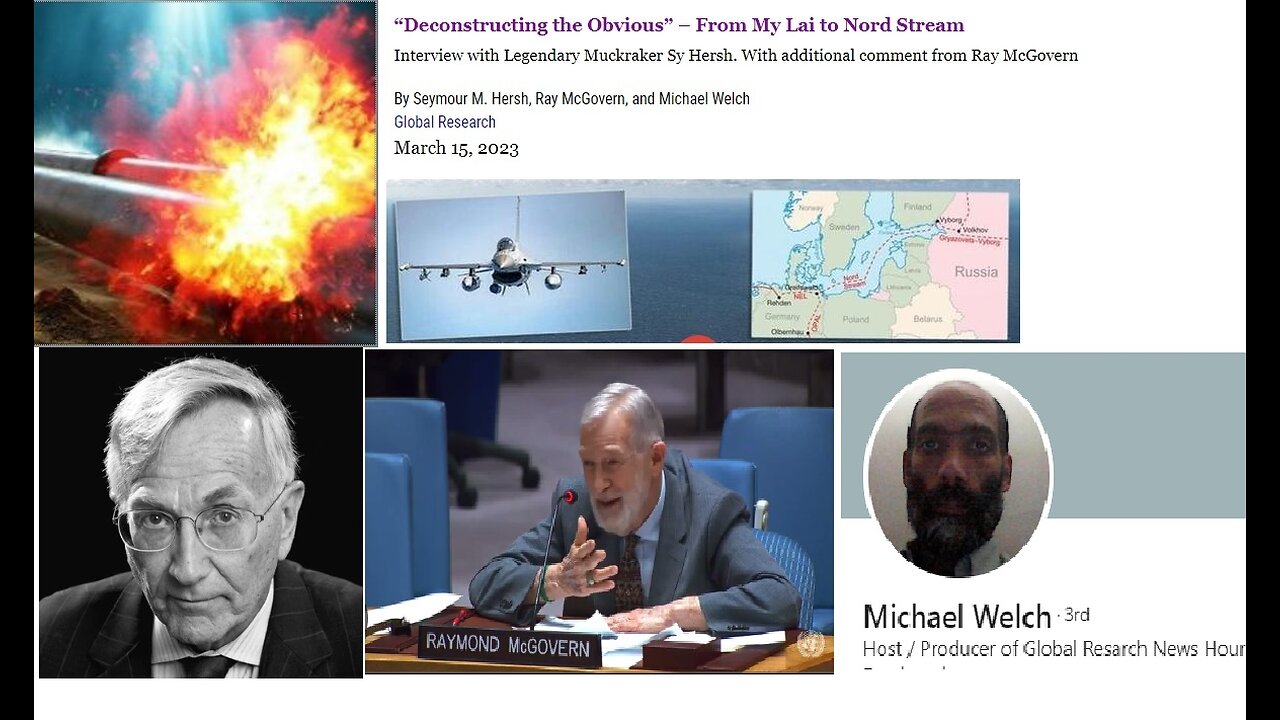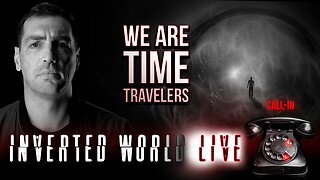Premium Only Content

Seymour Hersh rare interview on Nord Stream 2, and Ray McGovern on Ukraine. Global Resarch News Hour
Seymour Hersh rare interview on Nord Stream 2, and Ray McGovern on Ukraine. Global Resarch News Hour
Edited Transcript of Seymour Herst interview (March 6, 2023)
Global Research: The founder of SpaceKnow, Jerry Javornicky, reported that there were two dark ships in the vicinity just a few days previous to when these attacks happened. And Otto Tabuns, director of the Baltic Security Foundation said it would not – “It would not be common practice to have AIS turned off, unless the vessels have a declassified military mission or they would have some clandestine objectives, because the Baltic Sea is one of the busiest seas in the world in terms of commercial traffic.” I’m not saying there’s anything wrong with your facts or anything like that, but I’m saying that, you know, is this a part of the bigger picture, you know? Or is it just a red herring? What are your thoughts about that?
Seymour Hersh: I’m not sure what you’re asking. Are you asking that – are you asking that because there are others who work in open-source intelligence have a different understanding? Well, people in open-source, they’ve sort of quieted down in the last couple of weeks.
GR: Yeah.
SH: But basically they said, for example I describe an airplane, an American surveillance airplane that was flown out of a base in Norway, was to trigger the bombs. And the bombing took place on September the 26th. They were – about sometime in the morning they dropped the sonar beam which was going to go through – you know, you have to use very low frequency in low water. If you go to a high frequency, the water just absorbs it. Low frequency hits a receiver down below, that’s 260 feet where the pipeline’s end and they trigger device that triggers the explosion. And all it takes is 20, 30, 40, I don’t know how long. Usually about two minutes for the divers to get out – two hours, rather, for the divers to get out to safety. So, they usually set for 48 hours, but I have no idea how long they set them for in this case.
And so, the open source guys, they said there’s no such claim there. And they also described the ship I use, it was Alta-class minesweeper – or minelayer, there are two different designs, I don’t remember which it was. One lays the mine, and one finds it – hunts it. There’s a mine hunter and a mine sweeper, and they’re slightly different. And one couldn’t find that at any time that’s compatible with the time that I said the explosion took place.
And I will tell you about open-source intelligence. I can just tell you about what happened a couple – about 10 days ago, more than that: our president, President Biden, flew to see Zelensky, if you remember. They had a visit – he went to Kyiv, he showed up in Kyiv and took a walk with him. I don’t know if you remember reading that but it was in the newspapers. And the account – it was either the Washington Post or the New York Times account, a very detailed account of this security risk that he took.
And it describes as the plane got into Poland, at some point it turned off their transponder. If you don’t know what a transponder is, it’s an IFF signal, IFF signal that all commercial – all planes have to use, so everybody knows where they are in case of a problem. They turned it off. Why did they turn it off? Because they didn’t want to be seen. So, maybe just the American plane that dropped the buoy on a very highly classified mission, maybe they did tune off their transponder rather than be – you know, open-source intelligence doesn’t see anything. When they’re talking about two dark ships, they’re talking about images, electronic pulses. And I can tell you that, on a mission like this – I’ve actually asked that question – open-source becomes a great asset, because you can make up anything.
People in the intelligence community, that I know of, this is – the NSA, the National Security Agency was involved in this too, the mission to build – to give the President an option to bomb the pipelines. They could have recreated a major Japanese task force scheming towards Hawaii, you know, for Pearl Harbor, you know. They could have created anything they wanted in the water. So, when you start talking about, ‘They couldn’t track this and they couldn’t track that,’ they’re just ignoring the possibility that there are people that know exactly what an open-source intelligence does. And rather than ignore it, you use it as part of a cover. Of course he didn’t have his transponder on, of course he wasn’t seen, of course the ship, the Norwegian Alta-class minesweeper, whatever it was – it could have been squawking on a different frequency. It turns out, when you’re given a code, detonating code, you have to punch in the code. But you can punch in any code in an emergency, you don’t have to punch in your own. You could fake it up, it’s that simple. But you know, you can’t fight people who are… And you know, the whole source issue…
I left some string in there that people in the White House – there were a couple of phrases I used that they knew I had something going, you know. So they just denied the story, they’re going to deny it, they’re never going to admit it, I don’t think, the White House, how could they? Even if somebody came out and acknowledged that they did it,
GR: Yeah.
SH: I’ve been in this business for 50 or 60 years and I’ve never had anybody that – who talked to me ever get in trouble.
GR: Right, yeah.
SH: That’s because I take the heat, being opaque about sources. I say a source who accessed the information. I don’t indicate that there’s no sign that anybody I knew was actually in a meeting, none whatsoever. And that’s all purposeful. It makes it – if you really don’t what the story, it makes it easier just to pretend that it’s not a good story.
You know, the President, when he went to Kyiv he took a walk in mid-day. And you know what happened? The bombing alarm signal, the sirens that indicated a Russian bombing was coming, a Russian attack – their warning signal, I guess, I forget. In World War II – I don’t know what they called it – you know, the sirens would ring. And it hadn’t rung in 10 days before, and it – I know for a few days afterwards it hadn’t rung. But when they were taking the walk, the warning signals came on of an imminent air attack. And you know what I say? I say, if I’d been a reporter I would have said to the White House, ‘Did you guys set it up so it rang when he was walking in mid-day in the middle of Kyiv so he could look more heroic?’ But that’s what I basically – that’s the only explanation I have for it. Because there was no air raid. So, here comes all these air raid sirens and the press all writes about it. It’s amazing.
It’s just like there’s no skepticism about anything anymore in the media. I worked at the New York Times for seven or eight years, and I republished story after story about important stuff: the CIA and Allende and the CIA spying on American citizens without naming a source.
Seymour Hersh in Conversation. On U.S. Sabotage of Nord Stream Pipelines
GR:Yeah.
SH: There was no trouble then. You could do it, that’s part of the business. To get explicit about a source, puts you in jail.
GR: Logic suggests that if anything else, given your reputation for protecting whistle-blowers and accepting it and being vindicated you would think that this justifies a further expansion of an objective investigation. And I recall during February 22nd-24th, I mean there was Jeremy Sachs and Ray McGovern, a former CIA analyst, who were presenting a deposition to the UN Security Council, you know, talking about the need for a further investigation. You know, it seems that Russia wanted to have the UN Security Council bring about a more objective investigation, because you know, the people there from Denmark and Germany and Sweden are saying, ‘Well, no, then we’re doing our own investigation.’ But, I mean, Russia was saying, ‘Well, we don’t necessarily trust these people who are kind of compromised belonging to NATO.’ And yet, the British representative was saying, ‘Well, actually, the Russians are just trying to stir up – create a platform for spreading disinformation, they don’t want objectivity.’ I’m not going to ask you which of those views you believe, but I think it does seem to suggest that, you know, it’s not just the United States. Like all of the NATO allies seem to be willing to collaborate with this. What are your thoughts?
SH: Well —
GR: Are they being blackmailed, or what?
SH: You know, what difference does it make what I think? Come on. What you’re missing is that one of the most strident objections to an investigation came from the United States. Absolutely. And it came from the US. And so, that, to me, would be the most salient point, that the Americans don’t want an investigation. Why doesn’t anybody ask the White House, since the President of the United States – we don’t know what the President thinks. Well, he just had his spokesperson say, “No,” and his spokesperson for the CIA say, “No, it’s a lie.” I guess if I were – if I had a chance to ask a question of Mr. Biden, but he seems to be in a controlled environment most of the time – which President’s are, that’s legitimate – I would just say: “Well, you’re President, and you didn’t do it, you say. You worry about Russia. But you know, you’re President, why don’t you ask your intelligence community?” There’s something called the ONI, Office of National Intelligence which is the top dog among all of the dogs in the intelligence world. Why doesn’t – the term of artist called “Teske” – why doesn’t the President – why don’t you just test the American intelligence community to do a deep study and tell you who did it? Because we monitor everything, we could find out who did it. You could ask the guy who runs the intelligence – for the Director of National Intelligence – has access to everything. Everything: covert, non-covert, signals. The CIA has a branch called the Directorate of Intelligence that does great work. And another lower level if you have a group in the field like there was in Norway, at that time there/s a special unit in the CIA that – and an agency that monitors even local phone calls to make sure they’re still covert, they’re not being exposed. Or somebody’s neighbour is saying there’s something funny going down, you know, across the street. Of course they’re on an island, but still. Why didn’t they ask that question?
Why does nobody want to ask that question? I don’t know why somebody in the White House Press Corps doesn’t. When I was at the New York Times, I was given the honour of being asked to be the White House corespondent, this was in the ‘70s, and I was an investigative reporter. I didn’t want to have a beat, even at the White House. And I was under pressure to do it on grounds that this is the way you could become a columnist and become an editor, you know, that kind of stuff. They wanted me to do it. 1973-1974 during Watergate. And I went for one day, and I saw the press record, yell, and scream at Ron Ziegler – who was Richard Nixon’s press secretary – yell and scream at him and call that reporting. And after one day, I told Abe Rosenthal, the editor of the paper, that I don’t want the job. I won’t cover the White House, that’s not being a reporter, it’s being a yahoo. They were very angry at me about it, and I eventually threatened to quit. And I got my way, I got taken off the beat. And got back to being a reporter.
There’s something about the White House beat that’s very insidious, because if you make trouble, you don’t get access. That’s what it’s all about. Apparently, a secret source now is the press secretary calling you into her office or his office with a senior official and gives you a private briefing about something. And in you go with it, no questions asked. That’s what’s passed for intelligence these days – or good reporting. It’s very sad, it makes me sad. I was there in a different world. We need to be much more skeptical of everything.
GR: Okay, so if you look at Germany, okay? This is an area where, I mean, they were directly affected by this attack on the pipeline. And yet, in the parliament, nobody is talking about this report seriously of you —
SH: It’s not so,
GR: — they’re discrediting —
SH: — it’s just not so. I’ve been in the Bundestag, there’s been a lot of debate. I mean, it’s not an —
GR: Well, there’s the AfD and the Die Linke that were saying that but most of the other people, like the government is saying that they want to downplay it, you know, for security reasons.
SH: Well, of course they’re going to want to downplay it because they obviously know what happened and can’t admit they know. The whole purpose of – you have to know historically, since the Kennedy days there’s been an enormous amount of worry of America in the Cold War in our days of containment – that was the big theory, containment – containing the evil spread of communism or the spread of evil communism. And so, they’ve always been worried about the enormous reserves of Russian gas and oil that they were selling to Western Europe even back then. And pipelines were just beginning to go into Europe and there was a lot of stuff coming through Ukraine. And there was a lot of worry – constantly phrased, again and again – about Russia weaponizing its gas, cheap gas, and oil for sale to Germany and Europe in order to get some leverage with them. And maybe it diminished the power of NATO, diminished the cohesiveness. Western Europe has no gas or oil, they get raw materials from elsewhere.
And so, a fair question would be: why did Joe Biden choose the – it was the second pipeline, Nord Stream 2. The first pipeline, we’re talking about producing billions of cubic whatever it is measurements of gas hourly, daily. It just an incredible amount of gas. The first pipeline went online in 2011 and over the next 10 years, Germany became just wealthy, so much cheap, very good gas. Clean gas, methane gas. This industry is, you know, they have the largest chemical plant in the world, chemical company in the world, BASF, 100,000 employees. They were going full bore. You had the automobile dealers there, Mercedes, you know, all those wonderful cars they make. Expensive BMWs. They are there, big industrial powerhouse. And there was so much gas that the German government bought that gas at a fixed price from Russia, and was able to resell some of the gas Russia was selling at a fixed price for more money downstream to other distributors in Western Europe and make a profit from the gas that Russia was making and Russia let them do it. Putin – if you want to say Putin – but this all began very early in his career, 2009.
The second pipeline, Nordstream 2, was completed at the end of 2021. At that point, the war was – it seems clear Russia was talking about going to war. For whatever reason, it was sanctioned. The government of Chancellor Scholz, who was just here in a mysterious visit to Washington in which he never was at a public appearance, except for a few minutes with the President, no big deal, no dinner for him, nothing. It was just sort of a secret visit, I don’t know what the purpose was. Maybe they have Scholz show his face and not be asking any questions about anybody. Nobody even had a chance to ask him about the pipeline. But if you’re coming to the White House, you don’t want to ask those questions because you might not get called on again. If you ask a nagging bit of questions. I know it sounds stupid, but I’ve been there and I can tell you that’s the way it is. You want to make nice, you want to be a good guy. Well, you got the drift of what I’m saying.
GR: Yeah.
SH: The Germans have had a lot of debate about this.
GR: Yeah.
SH: And it’s not done. When he takes out the pipelines in late September —
GR: — it’s an act of war.
SH: — a winter is coming.
GR: Hm.
SH: Well —
GR: An act of terrorism—
SH: I just don’t know. I did a lot of – I did a lot of law review reading to find out. There’s actually no fixed law that says yet, that a pipeline, destroying it is a criminal offence. It clearly is but it hasn’t been adjudicated because nobody’s done it. There is a law dating back to 1884 about a telegraph line going across the ocean, and if you interfere with that, advertently or inadvertently, you’re guilty of the damages. So, we’re talking about something that produces X-number of billions. And maybe that’s the White House issue, they don’t want to be in the court of – you know.
It just – I mean, America – you know, you can do all the UN investigations you want. We basically control a lot of institutions. You know, exceptionalism. America’s exceptionalism is a big deal. Anyway, I’m just saying that in Germany, there is more conservation. Because what Biden did, by knocking off the pipeline, the war by then was going to be a stalemate, at best. Certainly not going to be a – you’re not going to beat Russia.
GR: This —
SH: In Stalingrad, the last Stalingrad, the Russians lost 2,400 dead and wounded every four hours and they beat Germany, the Nazis then. They’re not going to lose that war, they’re not going to win that war. And so, I think by Fall that was clear to everybody and I think Biden and his zeal to keep the war going because it was politically useful to him. Americans, we love our Presidents at war. I think at that point he chose to destroy the pipeline so that Chancellor Scholz, who controls – and that’s the second pipeline called Nord Stream 2 – he controlled – he had shut it down at the request from us, he sanctioned it. It was full of gas, 750 miles of methane gas, that’s why there was such a big outpouring of gas. It hadn’t started delivering yet, it was just frozen. He had the – or the chance to unfreeze it. I think Biden decided to take that away from him. And I think, ultimately, that’s going to be the big problem for Biden, particularly maybe next winter if it’s a bad winter.
GR: I mean, you’re seeing the people rising up on the outside, and tens of thousands recently in Berlin. I mean, is this going to lead to the end of this war, but the end of – dismantling NATO? Or are they going to perhaps to do something else to, maybe you know,push up the pressure to maybe even a – I don’t know – heaven forbid a nuclear false flag or something like that? What’s…
SH: There’s no question that we haven’t heard the end of the destroying of the pipeline. What Biden did is he basically told Europe, Germany and Western Europe: ‘we’ve had the backs of Western and Germany since World War II, we helped rebuild it, we turned it into model democracies, which is – they were, European countries are fun to visit. They are open, friendly. I mean, things are tenser now because of immigration, et cetera, and crime. But basically, they are – Western Europe is, if there was a success story for us after the War, that was in Western Europe in places like Greece – particularly Greece and Italy – we were so crazed about the extent of communism, we actually sided with some of the people who fought for the Nazis, in Greece in particular because they were anti-communist. I mean, after the War, we made a lot of horrible, really awful things we did in terms of anti-communism.
But not in Western Europe. It was left. And it became, ‘We’ve always had their back.’ America has been the bulwark of NATO of making sure Europe was – we spent a lot of money on tourism, we helped build things. Deeply avowed. And all that may be unraveled, because Biden showed that, when push came to shove, if he thought that the Germans would start taking Russian gas again by opening up the pipeline and thus maybe have less incentive to help him in the war in Ukraine, with money and tanks and planes which they were reluctant to do, particularly after what they did in World War II – they spent a decade burning, raping and destroying Western Europe. And so, there we are. That’s what it ultimately – and your question, you know, who knows what’s going to happen? It can’t be good for the cohesion of Western Europe in terms of supporting NATO. It can’t be good for NATO, even. You know, will some countries want to withdraw from NATO? Who knows.
GR: Hm.
SH: I just don’t know. It doesn’t matter what I think. I just know that it’s going to get much tougher. Germany survived this winter, it was a mild winter, and they also subsidize 20 percent, sometimes even more, of gas prices. But even so, it’s hurt the German economy quite a bit. BASF, for example, has been talking to China about moving some stuff there. And someone, I was just reading the other day, something with the largest bakers with 12 ovens produce wonderful, whatever it is the Germans like – they like a lot of schnecken, goodies – shut down eight of the ovens because they didn’t have enough gas or couldn’t afford to buy the gas. Gas has just jumped 19 percent there. But in Spain and France, people are paying as much as five times as much for electricity, which is fueled by turbines. Power turbines are fueled by gas. It’s three to four times as much for natural gas in Italy. That’s going to happen too throughout Western Europe this winter. And that’s when you’re going to see some serious dislocation.
The politics of the destruction of the gas line, whether it’s an act of war or what, but it was a slap in the face of Europe. Saying, you know, ‘If you’re not going to play ball with me and Ukraine –’ says the President, ‘–I don’t care what happens there.’ ‘I don’t care if it’s going to be harder to keep your people wealthy and warm,’ basically that’s what he’s done. And that’s the real input of the story.
GR: Your work was lauded in the ‘60s and in the ‘70s and beyond. But now, it seems suddenly unwelcome around a time when you criticized, I believe, Barack Obama over the killing of Osama Bin Laden and the deceptive way his conclusions about the Syrian government was using chemical weapons in Ghouta, when Syrian opposition was also a likely target. I mean, what, in your view, has changed to the degree that your brand of journalism is not as welcome at the New York Times or the Washington Post was in the past?
SH: What do I know about it? I mean, I don’t – I don’t know if the numbers of people who’ve read the papers haven’t run the story. But you know, I will tell you the response that Substack – I don’t even know much about Substack. But a friend of mine, Matt Taibbi, told me that, ‘Don’t underestimate it.’ And it’s quite powerful, the story is out there, it’s really out there everywhere. They had 1,000,000 hits on that story within a day and it’s been going on and on and on. And I’ve written three or four more and I’m writing another one. I’m going to be writing more about it.
It’s as if what I hear from people who write me, who read stuff from the Substack and other places, is that they understood that this kind of journalism did exist and has existed before. They just weren’t seeing enough of it. I mean, we actually had a story that the New York Times ran on Page 1 for two days about two or three years ago when the Afghan War was still going on. And there were occasions where the Aghans would shoot an American, because they were very angry at what happened there. The Afghan army wasn’t happy with our total control of most things there. And so, one of the stories said that Afghan soldiers – quoting anonymous sources, speaking of anonymous sources – that the Kremlin was paying bounties to Afghan soldiers that killed an American GI on duty in Afghanistan. And that story disappeared because it was a complete fraud. But when you run that kind of stuff, you really lose credibility, you know, that kind of madness.
The xenophobia about Putin is, I guess, inevitable. We’ve always liked that. There’s a long list of Hitlers we’ve had since Hitler, you know? We’ve just got a list of about 30, you name them. Gaddafi was a Hitler at one time. Bashar Assad is, Saddam was. Mao was, Zhou Enlai was. Gorbachev was. And whoever – you know, we just go through it. We have this great penchant for hating. And Putin right now. And by the way, let me say, anybody that starts the most deadly war, bloody war, in Western Europe since 1945 as Putin has done, you can’t – you know, you can just marvel at what made him commit this incredibly stupid act, no matter how much provocation he had. It wasn’t unjust. We lied about expanding NATO to the East, among other things. And we put missiles 800 miles capable of taking out downtown – most of Moscow, because the warheads we have are so powerful now. One hundred times more powerful than – vastly more powerful than the bombs we dropped over Hiroshima and Tokyo – Hiroshima and Tokyo, yeah too, God damnit. I’m thinking, we’re the only country in the world that worries when others have the bomb, we’re the only country that actually used one. Actually, we did it twice.
So anyway, we can talk all week about it. The media today, as you just said earlier, isn’t the media it was when I was around. It’s a lot different. You either have – you either like Fox, or like CNN, or MSNBC, and none of them come close to giving you news. You know?
GR: Yeah.
SH: MSNBC, if they’re not talking about January 6th, they’re talking about this guy who was elected a Republican to the House who’s sort of a – he’s not only just a liar, he’s probably very sick, too. He enjoys being called out. I think he’s very delusional. He’s not interesting to me, he’s so crazy. What’s his name? Sandoval? The one that’s in trouble. Remember he was elected from a House district that had some in West Chester. Or I think it was some in Brooklyn, and some in the New York Counties farther East. But anyway, I don’t know whatever his name is. He’s more of a crazy man than anything else.
GR: Yeah. Well, I’ll just ask one more question, I guess just to kind of tack it off, because we are 10 days away from the 55th anniversary of My Lai. I know that I heard that you went back to My Lai decades later to actually, you know, check it out and at the response – at the invitation by the Vietnamese government. And it turns out that you actually met a survivor of the massacre. So, I was just wondering how that experience may have resolved or capped off this really historic story that basically set you as a force to be reckoned with in the journalistic world.
SH: You could never cap it off. It’s always there. I didn’t know the anniversary is coming up. I don’t take pleasure in that story. Obviously, it was a big story for me, I was a freelance writer. And I was writing about a massacre that took place a year and a half earlier. And it did change the course of the war, I think.
But still, you know, I was in the Army as a grunt, with a rifle M1. And I went through basic training with a bunch of kids. And I remember distinctly that there was some alert that there was a dispute between North and South Korea. We were put on alert, which was crazy. We were – you know 1961/1962. We couldn’t care less about the Army. We did our thing but we just waited to get out. I remember I probably would’ve gotten on the plane to Korea and fight the North Koreans or maybe the Chinese, who knows, and be murdered like we were in 1950. Not because of the flag but because of my colleagues, I had my buddies and friends. And so, you wonder, the kids that did what they did, you know, what their motives were. Look, it’s just – the truth of the matter is, anybody who starts a war is – you know, like Putin did. Although, I must say the provocation was acute and we had to know what we were doing. I think this administration has lost its mind about communism, the way they talk to the Chinese and the way they talk to the Russians, it’s just not credible. It’s just crazy, it just doesn’t make sense, it’s just being totally provocative.
I guess they think it doesn’t – you know, Tony Blinken, Secretary of State, wouldn’t go to a meeting with his peers in China because of a balloon. Remember that?
GR: Yeah.
SH: A couple of weeks ago because of a balloon.
GR: Sure.
SH: Weather balloon or whatever it was. I mean, a balloon? He cancelled a meeting because he was – they’re just, you know… They’re just children. And this is a really serious business. And I’m sorry, about the President’s leadership isn’t there on this issue.
GR: Mm-hmm.
SH: And so, let me leave it at that. No, I don’t take pleasure in – no, I – you know. And by the way, I was a ghetto kid. And by that I mean, even though I went to the New York Times in the heyday of, you know, people there were the editor of the Harvard Crimson and the Yale Daily News and stuff like that. I grew up in Chicago, my first language wasn’t even English, even in the house. You know, my father ran a small laundry cleaning shop in Chicago’s black ghetto, on 45th Street in the area. I worked there since 13, and when he got cancer I was just 15 when he died two years later after a long and horrible evolving cancer that went from everywhere to his brain. And I was the least afraid of him in my house, so I could take care of him.
Then I got a scholarship – or got – I don’t think – a no-fee, $800 a quarter to the University of Chicago. And I got an education there in the middle-late 1950s, in which you did read textbooks, you just read the original material. So, you learned to think for yourself. Critical thinking was the whole idea.
And so, I come to My Lai 10 years later as a police reporter and I worked for the United Press covering a State House in South Dakota which was fun. I’d never been there. I spent the winter in South Dakota. And then I worked for the AP in Chicago where I had a great time. And then, in Washington where I had covered the War. Covered the Pentagon. And then, a couple years later I do My Lai. And I’m 11 years out of college. I know no rich people. And I do this story sticking two fingers to the My Lai story about a massacre that was covered up by everybody: Kissinger, Nixon, you name ‘em. And Westmoreland, who ran the War. I’m sticking two fingers in the eye of a sitting president, Richard Nixon. And in many countries in the world, I would’ve been in a gulag for doing that. Not here. Fame, fortune, and glory, right?
GR: Yeah.
SH: Changed my life, I became a player then.
There’s no way I’m going to ever underestimate America and the freedom it has. Even though we have all of these problems with guns, of awful legislature, I mean, give me a break. When I was doing stuff on the War in the ‘70s for the New York Times, my friends were in the Senate, in the House, in the Democrats. And also there were many moderate Republicans. The famous War Powers bill of 1973 barred Nixon from using forces again in Vietnam, was written by a Republican. A Republican senator of many years. I mean, then we had a different Congress. Can you imagine now Chuck Schumer, who’s now the head of the Senate, calling for an investigation into whether or not the White House was involved in the hitting of a pipeline? Not a chance. So, it’s a bad time.
Notes:
https://news.gallup.com/vault/190886/gallup-vault-urge-demonstrate.aspx
https://www.britannica.com/event/My-Lai-Massacre/Cover-up-investigation-and-legacy
https://blogs.dickinson.edu/hist-118pinsker/2017/04/19/2895/
https://www.reuters.com/world/us/prize-winning-reporter-seymour-hersh-no-stranger-controversy-2023-02-09/
https://seymourhersh.substack.com/p/how-america-took-out-the-nord-stream
Seymour Myron “Sy” Hersh is an investigative journalist and a political writer. He won a Pulitzer Prize for International Reporting in 1970 for exposing the My Lai massacre and the cover-up. At the New York Times he covered the Watergate scandal, the secret U.S. bombing of Cambodia and the CIA’s program on Domestic spying. He has written eleven books and has also won a record five George Polk awards, and two National Magazine Awards. He lives in Washington DC.
Ray McGovern works with Tell the Word, a publishing arm of the ecumenical Church of the Saviour in inner-city Washington. During his 27-year C.I.A. career he supervised intelligence analysis as Chief of Soviet Foreign Policy Branch, as editor/briefer of the President’s Daily Brief, as a member of the Production Review Staff, and as chair of National Intelligence Estimates. In retirement he co-founded Veteran Intelligence Professionals for Sanity (VIPS).
Copyright © Seymour M. Hersh, Ray McGovern, and Michael Welch
Fake Meat Dangers
-

Inverted World Live
4 hours agoWe Are Time Travelers | Ep. 100
35.4K4 -
 2:57:09
2:57:09
TimcastIRL
4 hours agoCorporate Press Refuses To Mention Minneapolis Shooter Was Trans | Timcast IRL
158K78 -
 LIVE
LIVE
Akademiks
3 hours agoWar in RAT-LANTA. Young Thug vs Gunna vs Ralo vs YSL MONDO. Who Will Le Bebe Pick. FINAL CRASHOUT!
2,063 watching -
 1:02:24
1:02:24
Man in America
7 hours agoThe Final Battle: Nanotech, Transhumanism & the War for Your Soul w/ Dr. Ed Group
20.4K2 -
 39:56
39:56
Sarah Westall
1 hour agoUpcoming World Wide Economic Collapse/Deep Recession & What the Big Money is Doing w/ Ed Dowd
6.76K3 -

Barry Cunningham
3 hours agoIT'S MOVIE NIGHT WITH BARRY!
23.6K16 -
 31:05
31:05
The Why Files
2 days agoPeru's Most Terrifying Mystery | The Face Peelers
29.9K41 -
 1:32
1:32
Gaming on Rumble
11 hours agoWhat is the Rumble Creator Program?!?! | Lvl UP
21.9K4 -

Flyover Conservatives
23 hours ago9/11 on Steroids: What’s Coming This Fall? - Bo Polny | FOC Show
28.8K2 -
 1:01:28
1:01:28
Precision Rifle Network
8 hours agoS4E27 Guns & Grub - Let's Talk About Gas Guns
15K1